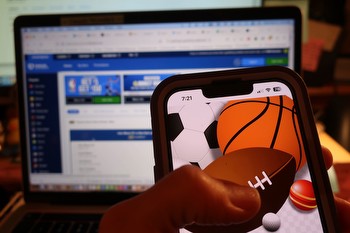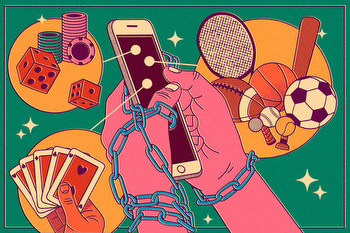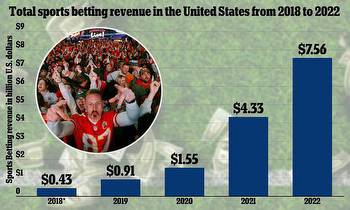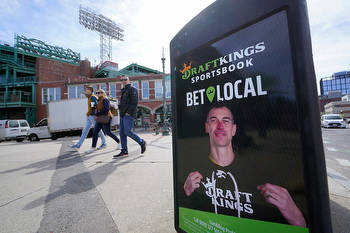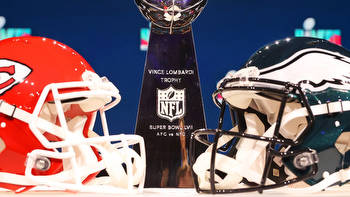Sports betting popularity leads to growing concern over problem gambling
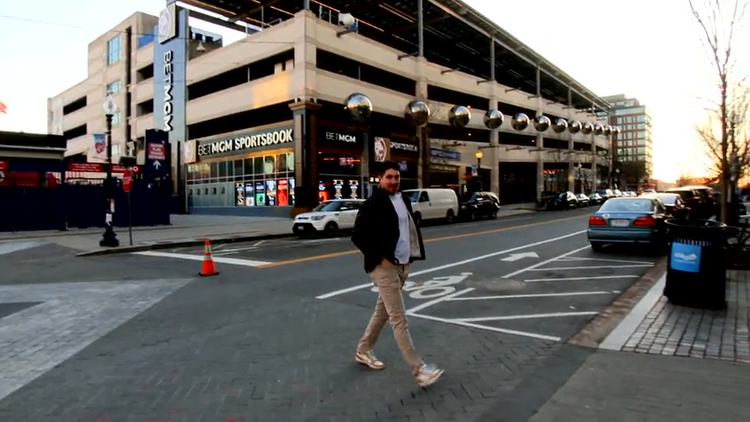
March Madness is kicking into high gear this week, and concern over problem gambling is also top of mind. More Americans are betting on sports than ever before, since the legalization of online sports betting in nearly 40 states.
U.S. adults are expected to make nearly $3 billion in legal bets on NCAA basketball games this year, according to the American Gaming Association. That’s nearly double the amount bet legally on the Super Bowl just a month ago in February.
One expert told Spotlight on America National Investigative Correspondent Angie Moreschi that gambling addiction is "a ticking time bomb for society."
Chasing the Winner’s High
From casinos to lotteries to horse racing, Americans have long chased the odds of winning on a wager.
“Winner, winner, chicken dinner, hahaha!” frequent gambler and Washington, D.C., resident Raphael Haskell laughed as he described the rush he feels when he wins a bet.
Haskell talked with Spotlight on America’s Angie Moreschi outside Caesar’s Sportsbook, next door to Capital One Arena in the city. He comes here to place bets every day.
“I'm having a good time! I'm having the time of my life!” he said.
When asked if he loses more than he wins, he told Spotlight he thinks it’s about 50-50, but doesn’t keep track.
“That’s what my friends tell me, but I don’t believe that. Only God knows the truth. I don’t keep up on it,” Haskell said.
Supreme Court Opened the Door
Going after that winner’s high has gone into overdrive since a Supreme Court decision in 2018 made it possible for states to legalize sports betting. The court overturned a rule that prohibited sports betting outside Nevada.
“What we're seeing since 2018 is the largest and fastest expansion of gambling in our nation's history,” the National Council on Problem Gambling's executive director Keith Whyte told Spotlight on America.
Whyte said that Supreme Court decision opened the floodgates to more gambling nationwide. In the past six years, 38 states and Washington, D.C., legalized some form of sports betting.
Sports betting remains illegal in just 12 states: Alabama, Alaska, California, Georgia, Hawaii, Idaho, Minnesota, Missouri, Oklahoma, South Carolina, Texas and Utah.
Sports Betting Apps Attracting New Bettors
With the spike in legalized gambling, the National Council's research indicates the risk for gambling addiction rose by 30 percent between 2018 and 2021 alone.
While free-standing gambling centers are big attractions, the biggest drivers in the recent gambling surge are sports betting apps.
Commercials with big stars like Tom Brady for BetMGM, Charles Barkley for FanDuel, and Kevin Hart for Draft Kings amp up the adrenaline.
And they offer enticing deals, like "bet $5 and get $150 in bonus bets guaranteed," to attract new bettors, especially young men, the fastest growing demographic of gamblers
Washington, D.C., resident Chris Niebuhr is in the target audience and he says it’s working.
Correspondent Angie Moreschi found him outside the BetMGM Sports Book, next door to Nationals Park baseball stadium.
NIEBUHR: 25.
NIEBUHR: I'm exactly who they're marketing to.
NIEBUHR: Certainly, I'm on the app, hahaha.
Many bettors who use the sports betting apps told us they do feel addictive at times.
“I think it's easy to get sucked in,” Niebuhr said. “I mean, it's like, you lose a little bit and you want an opportunity to win that money back. It's hard, you know.”
Frequent bettor Robert Ford, also a D.C. resident, said the app he uses often makes him want to bet more, so he has to check himself.
“Sometimes I worry if I lose too much, I need to stop,” Ford said.
Technology Plays on Risk Factors
“Technology is having a massive negative impact,” according to the National Council on Problem Gambling’s Whyte, driving up the risk of gambling addiction.
He said having the apps on your smartphone plays right into known risk factors in gambling: speed and frequency of play.
He told Spotlight on America the addition of sports betting apps has been a game changer.
“It can make it so easy to get into trouble,” Whyte said. “It is a cocktail for people to get into problems and get into deep problems, uh, almost overnight.”
With the help of lightning-fast analysis by artificial intelligence, the apps offer seemingly endless propositions. You're not just betting on the outcome of a game anymore. They have what are called "micro bets" on any little action within a game: Will they get that first down? Will he make that free throw?
The app technology analyzes your habits and even alerts you to possible wagers, making it so easy to keep betting with just a simple tap on your phone.
“Driven by A.I. and delivered directly to your phone, in some cases, it may be impossible to resist,” Whyte said. “You know, it's the perfect bet at the perfect time, every couple minutes.”
Societal Impact
While most people can control their gambling, the National Council estimates 3 to 4 percent of the population, about 9 million Americans, experience problem gambling.
“It’s when your gambling is causing harm to yourself, your family, your vocation — emotionally, financially, even physically,” Whyte explained.
Whyte said problem gamblers also have a 20 percent higher risk of suicide.
He called it a public health crisis and stressed that gambling addiction often ends up hurting not just the individual, but also families, communities, and businesses.
“Many people with gambling problems report committing theft or white-collar crime to finance their gambling,” Whyte said. “Roughly 70% of people with severe problems report that they've committed a white-collar crime to finance their gambling.”
Each bettor we talked with said they make a conscious effort not to get carried away.
“It's good to put limits on yourself, limits on how much you spend, limits on your time on the app,” Niebuhr explained.
And Haskell told Spotlight he puts limits on himself so it doesn’t get out of hand.
“Bet responsibly and don't bet what you can't afford to lose,” Haskell said. “It’s really important because you don’t want to lose your rent. You want to pay your bills and stuff like that, you know.”
Need for Treatment & Prevention
Americans wagered a record $120 billion on sports betting in 2023, according to the American Gaming Association, but Whyte said just $105 million — less than one-tenth of one percent — went to treatment or prevention.
Whyte said with so much money being made comes a responsibility to minimize harm, both from the industry and government.
“In most states, it’s still a private company overseen by the state [that runs sports betting] but in about half a dozen states, the sports betting is run by and through their state lottery,” Whyte explained, “So it’s your state government saying, ‘We want you to bet on sports.’”
It’s up to each state to decide whether a portion of the money made on gambling will go to address problem gambling. While most do require a portion of revenue go to prevention, Whyte said eight states and the District of Columbia have no public funding for problem gambling, whatsoever.
And he said, despite the federal government making more than $260 million in excise taxes on gambling last year, no federal money is dedicated to gambling addiction treatment or research.
He wants to see that change with the Gambling Addiction Recovery, Investment, and Treatment (GRIT) Act, introduced in Congress this January. The legislation would create the first-ever federal funding stream to address gambling addiction in the U.S. It calls for 50 percent of federal sports excise tax revenue collected to go towards prevention, treatment, and research.
“Our biggest concern is it will continue to spread unchecked,” Whyte said. “We need to work with every single segment of society to have a public health response, just like we did with alcohol and with opioids. Gambling needs to be in that same conversation.”
Warning Signs for Problem Gambling
March is Problem Gambling Awareness Month and the National Problem Gambling Helpline, at 800-GAMBLER (426-2537), reports seeing an all-time high in the number of people contacting them.
Whyte said, so far this year, every 90 seconds someone calls, texts, or chats 800-GAMBLER for help. That’s a dramatic increase since just 2023.
Here are some of the warning signs that you might have a gambling problem:
- Thinking about gambling all the time.
- Feeling the need to bet more money and more often.
- Going back to try to win your money back (“chasing losses”).
- Feeling restless or irritable when trying to stop or cut down.
- Feeling like you can’t control yourself.
- Gambling despite negative consequences.
In extreme cases, problem gambling can cause bankruptcy, legal problems, losing your job or your family, and thinking about suicide.









